Deck 12: Consumer Choice and Demand
Question
Question
Question
Question
Question
Question
Question
Question
Question
Question
Question
Question
Question
Question
Question
Question
Question
Question
Question
Question
Question
Question
Question
Question
Question
Question
Question
Question
Question
Question
Question
Question
Question
Question
Question
Question
Question
Question
Question
Question
Question
Question
Question
Question
Question
Question
Question
Question
Question
Question
Question
Question
Question
Question
Question
Question
Question
Question
Question
Question
Question
Question
Question
Question
Question
Question
Question
Question
Question
Question
Question
Question
Question
Question
Question
Question
Question
Question

Unlock Deck
Sign up to unlock the cards in this deck!
Unlock Deck
Unlock Deck
1/78
Play
Full screen (f)
Deck 12: Consumer Choice and Demand
1
If the price of the good measured on the x-axis becomes relatively cheaper, the budget line will
A) shift rightward and not change its slope.
B) become horizontal.
C) become vertical.
D) become flatter.
E) become steeper.
A) shift rightward and not change its slope.
B) become horizontal.
C) become vertical.
D) become flatter.
E) become steeper.
become flatter.
2
Oscar earns $1,000 per week as a fishing guide in Kakadu National Park. With this money he buys fishing lures and steaks. Lures cost $5 each, steaks cost $10 each. If Oscar purchases 124 lures per week, how many steaks can he buy?
A) 100
B) 620
C) 380
D) 123
E) 38
A) 100
B) 620
C) 380
D) 123
E) 38
38
3
If the slope of the budget line changes, there MUST have been
A) a change in the price of both goods.
B) a change in the price of at least one good.
C) an increase in the consumer's income.
D) a change in the consumer's preferences.
E) None of these could cause a change in the slope of the budget line.
A) a change in the price of both goods.
B) a change in the price of at least one good.
C) an increase in the consumer's income.
D) a change in the consumer's preferences.
E) None of these could cause a change in the slope of the budget line.
a change in the price of at least one good.
4
A budget line
A) shows the limits to what can be consumed.
B) has a slope equal to a relative price.
C) rotates or shifts only when the consumer's budget changes.
D) Answers B and C are both correct.
E) Answers A and B are both correct.
A) shows the limits to what can be consumed.
B) has a slope equal to a relative price.
C) rotates or shifts only when the consumer's budget changes.
D) Answers B and C are both correct.
E) Answers A and B are both correct.

Unlock Deck
Unlock for access to all 78 flashcards in this deck.
Unlock Deck
k this deck
5
Katie has $15. She likes M&Ms and Cadbury's white chocolate bars. M&Ms are $1.50 a pack and (the large) Cadbury bars are $3.00 each. Katie can choose to buy
A) 2 Cadbury bars and 6 packs of M&Ms.
B) 4 Cadbury bars and 2 packs of M&Ms.
C) 5 Cadbury bars and 10 packs of M&Ms.
D) Answers A and B are correct.
E) Answers A, B and C are correct.
A) 2 Cadbury bars and 6 packs of M&Ms.
B) 4 Cadbury bars and 2 packs of M&Ms.
C) 5 Cadbury bars and 10 packs of M&Ms.
D) Answers A and B are correct.
E) Answers A, B and C are correct.

Unlock Deck
Unlock for access to all 78 flashcards in this deck.
Unlock Deck
k this deck
6
If a consumer has $30 to spend on apples and bananas, where on the apple axis would the consumer's budget line intersect if the price of apples is $3 a kilogram?
A) 10 kilograms
B) 30 kilograms
C) 3 kilograms
D) Zero kilograms
E) It is impossible to determine with the given information.
A) 10 kilograms
B) 30 kilograms
C) 3 kilograms
D) Zero kilograms
E) It is impossible to determine with the given information.

Unlock Deck
Unlock for access to all 78 flashcards in this deck.
Unlock Deck
k this deck
7
Timmy makes $100 per week working in retail. He spends all this income to buy pizza and hair gel. The price of a pizza is $10 and the price of a bottle of hair gel is $4. If Timmy buys 6 pizzas per week, how many bottles of gel can he purchase?
A) 60
B) 40
C) 20
D) 10
E) None of the above answers is correct.
A) 60
B) 40
C) 20
D) 10
E) None of the above answers is correct.

Unlock Deck
Unlock for access to all 78 flashcards in this deck.
Unlock Deck
k this deck
8
Suppose Alice spends her entire budget on books and movie downloads. If her budget does not change, and the price of a book stays the same, but the price of a downloaded movie falls, her budget line
A) does not change because her budget has not changed.
B) shifts inward and its slope does not change.
C) shifts outward and its slope does not change.
D) rotates outward and its slope changes.
E) rotates inward and its slope changes.
A) does not change because her budget has not changed.
B) shifts inward and its slope does not change.
C) shifts outward and its slope does not change.
D) rotates outward and its slope changes.
E) rotates inward and its slope changes.

Unlock Deck
Unlock for access to all 78 flashcards in this deck.
Unlock Deck
k this deck
9
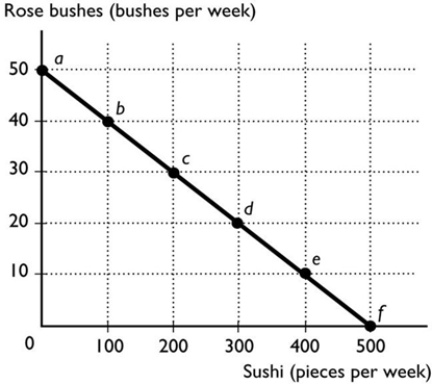
The figure above shows Sarah's budget line. Sarah earns $500 per week selling baskets. With this money she buys sushi and rose bushes. Each piece of sushi costs $1 and each rose bush costs $10. Sarah is NOT able to purchase the combination of
A) 50 roses bushes and 0 pieces of sushi.
B) 30 roses bushes and 300 pieces of sushi.
C) 0 roses bushes and 300 pieces of sushi.
D) 20 rose bushes and 200 pieces of sushi.
E) None of the above answers is correct because Sarah is able to purchase all the listed combinations of roses and sushi.

Unlock Deck
Unlock for access to all 78 flashcards in this deck.
Unlock Deck
k this deck
10
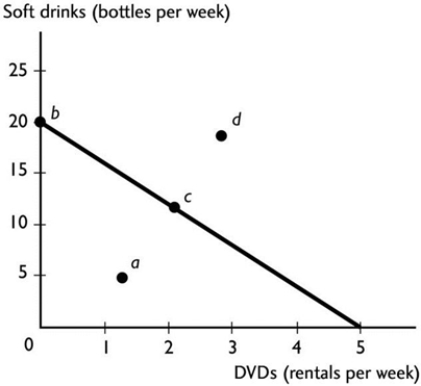
The figure above shows a consumer's budget line between soft drinks and DVD rentals. Point b represents an
A) affordable combination of soft drinks and DVDs that spends the entire budget.
B) affordable combination of soft drinks and DVDs that does not spend the entire budget.
C) unaffordable combination of soft drinks and DVDs.
D) affordable combination of soft drinks and DVDs but whether it spends the entire budget cannot be determined from the figure.
E) None of the above answers is correct.

Unlock Deck
Unlock for access to all 78 flashcards in this deck.
Unlock Deck
k this deck
11

The figure above shows a consumer's budget line between soft drinks and DVD rentals. Point c represents an
A) affordable combination of soft drinks and DVDs that spends the entire budget.
B) affordable combination of soft drinks and DVDs that does not spend the entire budget.
C) unaffordable combination of soft drinks and DVDs.
D) affordable combination of soft drinks and DVDs, but whether it spends the entire budget cannot be determined from the figure.
E) None of the above answers is correct.

Unlock Deck
Unlock for access to all 78 flashcards in this deck.
Unlock Deck
k this deck
12

The figure above shows Sarah's budget line. Sarah earns $500 per week selling baskets. With this money she buys sushi and rose bushes. Each piece of sushi costs $1 and each rose bush costs $10. Sarah will be at what point on her budget line if she spends $200 per week on sushi?
A) Point a
B) Point b
C) Point c
D) Point d
E) Point f

Unlock Deck
Unlock for access to all 78 flashcards in this deck.
Unlock Deck
k this deck
13
Which of the following is shown by a budget line? i. The combinations of goods a person can afford.
Ii) The production possibilities for a person.
Iii) The combinations of goods a person cannot afford.
A) i and ii
B) i and iii
C) ii and iii
D) ii only
E) i only
Ii) The production possibilities for a person.
Iii) The combinations of goods a person cannot afford.
A) i and ii
B) i and iii
C) ii and iii
D) ii only
E) i only

Unlock Deck
Unlock for access to all 78 flashcards in this deck.
Unlock Deck
k this deck
14

The figure above shows a consumer's budget line for soft drinks and DVD rentals. Point a represents an
A) affordable combination of soft drinks and DVDs that spends the entire budget.
B) affordable combination of soft drinks and DVDs that does not spend the entire budget.
C) unaffordable combination of soft drinks and DVDs.
D) affordable combination of soft drinks and DVDs but whether it spends the entire budget cannot be determined from the figure.
E) None of the above answers is correct.

Unlock Deck
Unlock for access to all 78 flashcards in this deck.
Unlock Deck
k this deck
15

The figure above shows a consumer's budget line between soft drinks and DVD rentals. Point d represents an
A) affordable combination of soft drinks and DVDs that spends the entire budget.
B) affordable combination of soft drinks and DVDs that does not spend the entire budget.
C) unaffordable combination of soft drinks and DVDs.
D) affordable combination of soft drinks and DVDs, but whether it spends the entire budget cannot be determined from the figure.
E) None of the above answers is correct.

Unlock Deck
Unlock for access to all 78 flashcards in this deck.
Unlock Deck
k this deck
16
Which of the following describes what happens to a consumer's budget line if that consumer's budget increases?
A) The budget line becomes more horizontal.
B) The budget line becomes steeper.
C) The budget line shifts further away from the origin of the graph.
D) The budget line shifts closer to the origin of the graph.
E) The budget line does not change.
A) The budget line becomes more horizontal.
B) The budget line becomes steeper.
C) The budget line shifts further away from the origin of the graph.
D) The budget line shifts closer to the origin of the graph.
E) The budget line does not change.

Unlock Deck
Unlock for access to all 78 flashcards in this deck.
Unlock Deck
k this deck
17

The figure above shows Sarah's budget line. Sarah earns $500 per week selling baskets. With this money she buys sushi and rose bushes. Each piece of sushi costs $1 and each rose bush costs $10. Sarah will be at what point on her budget line if she spends $500 per week on rose bushes?
A) Point a
B) Point b
C) Point c
D) Point f
E) Point e

Unlock Deck
Unlock for access to all 78 flashcards in this deck.
Unlock Deck
k this deck
18
Samantha has a budget of $40 and buys beef jerky and fried pork rinds. Her budget does not change and the price of both beef jerky and fried pork rinds increases. As a result,
A) Samantha's consumption possibilities have decreased.
B) Samantha's budget line shifts inward.
C) Samantha can still buy the combination of beef jerky and fried pork rinds she was initially consuming because her budget did not change.
D) Answers A and B are correct.
E) Answers A and C are correct.
A) Samantha's consumption possibilities have decreased.
B) Samantha's budget line shifts inward.
C) Samantha can still buy the combination of beef jerky and fried pork rinds she was initially consuming because her budget did not change.
D) Answers A and B are correct.
E) Answers A and C are correct.

Unlock Deck
Unlock for access to all 78 flashcards in this deck.
Unlock Deck
k this deck
19
Which of the following statements is correct?
A) Along the budget line, consuming more of one good implies consuming more of the other.
B) The slope of the budget line shows the opportunity cost of the good measured along the x-axis.
C) The slope of the budget line shows there is no tradeoff between the two goods because the consumer can buy each of them.
D) If the consumer's budget increases, the budget line shifts leftward and its slope does not change.
E) None of the above answers is correct.
A) Along the budget line, consuming more of one good implies consuming more of the other.
B) The slope of the budget line shows the opportunity cost of the good measured along the x-axis.
C) The slope of the budget line shows there is no tradeoff between the two goods because the consumer can buy each of them.
D) If the consumer's budget increases, the budget line shifts leftward and its slope does not change.
E) None of the above answers is correct.

Unlock Deck
Unlock for access to all 78 flashcards in this deck.
Unlock Deck
k this deck
20
Which of the following statements is correct?
A) A budget line changes ONLY IF the person's budget changes.
B) Rich consumers are unaffected by prices.
C) Consumers have the ability to buy everything they desire.
D) A consumer's budget line shows the limits to what a consumer can buy.
E) A consumer's budget line shows the goods with the highest marginal utilities.
A) A budget line changes ONLY IF the person's budget changes.
B) Rich consumers are unaffected by prices.
C) Consumers have the ability to buy everything they desire.
D) A consumer's budget line shows the limits to what a consumer can buy.
E) A consumer's budget line shows the goods with the highest marginal utilities.

Unlock Deck
Unlock for access to all 78 flashcards in this deck.
Unlock Deck
k this deck
21
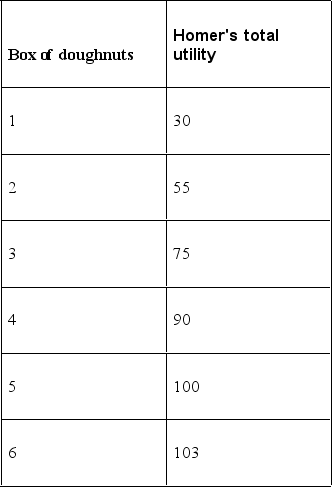
The above table shows Homer's utility from boxes of doughnuts. The marginal utility that Homer receives from the third box of doughnuts is equal to
A) 20.
B) 50.
C) 75.
D) 3.
E) 25.

Unlock Deck
Unlock for access to all 78 flashcards in this deck.
Unlock Deck
k this deck
22
If you get 40 units of utility from eating the first bag of pretzels, 30 from the second bag, and 20 from the third bag, the total utility of three bags of pretzels is ________ units of utility.
A) 40
B) 90
C) 50
D) 20
E) 70
A) 40
B) 90
C) 50
D) 20
E) 70

Unlock Deck
Unlock for access to all 78 flashcards in this deck.
Unlock Deck
k this deck
23
If Joan consumes 1 dinner roll, she has total utility of 15; if she consumes 2, she has total utility of 27; if she consumes 3, she has total utility of 37; and if she consumes 4, she has total utility of 45. What is the marginal utility of the fourth dinner roll consumed?
A) 11.25 units of utility
B) 124 units of utility
C) 45 units of utility
D) 8 units of utility
E) 37 units of utility
A) 11.25 units of utility
B) 124 units of utility
C) 45 units of utility
D) 8 units of utility
E) 37 units of utility

Unlock Deck
Unlock for access to all 78 flashcards in this deck.
Unlock Deck
k this deck
24
An increase in a consumer's budget
A) rotates the budget line outward around the point where it intersects the y-axis.
B) shifts the budget line inward and does not change its slope.
C) rotates the budget line outward around the point where it intersects the x-axis.
D) rotates the budget line inward around the point where it intersects the x-axis.
E) shifts the budget line outward and does not change its slope.
A) rotates the budget line outward around the point where it intersects the y-axis.
B) shifts the budget line inward and does not change its slope.
C) rotates the budget line outward around the point where it intersects the x-axis.
D) rotates the budget line inward around the point where it intersects the x-axis.
E) shifts the budget line outward and does not change its slope.

Unlock Deck
Unlock for access to all 78 flashcards in this deck.
Unlock Deck
k this deck
25
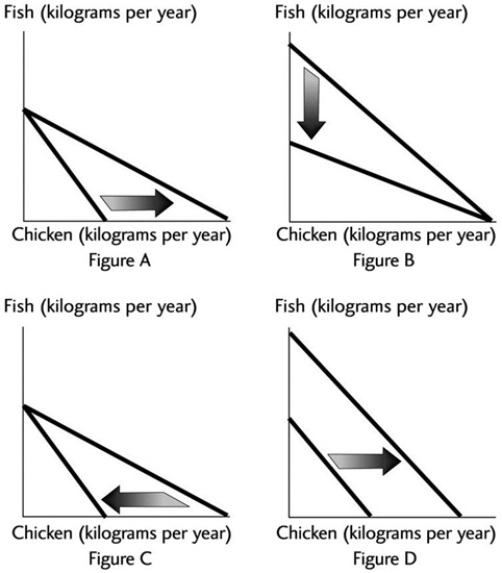
Which of the above figures reflects an increase in the price of chicken?
A) Figure A
B) Figure B
C) Figure C
D) Figure D
E) Both Figure B and Figure C

Unlock Deck
Unlock for access to all 78 flashcards in this deck.
Unlock Deck
k this deck
26

The above table shows Homer's total utility from boxes of doughnuts. As Homer's consumption of doughnuts increases,
A) his total utility increases, but his marginal utility decreases.
B) both his total utility and his marginal utility decrease.
C) both his total utility and his marginal utility increase.
D) his total utility decreases, but his marginal utility increases.
E) None of the above answers is correct.

Unlock Deck
Unlock for access to all 78 flashcards in this deck.
Unlock Deck
k this deck
27
Marginal utility is the change in total utility that results from
A) a change in the budget line.
B) an increase in the price of the good.
C) an increase in the consumer's income.
D) a one-unit change in the quantity of a good consumed.
E) a decrease in the price of the good.
A) a change in the budget line.
B) an increase in the price of the good.
C) an increase in the consumer's income.
D) a one-unit change in the quantity of a good consumed.
E) a decrease in the price of the good.

Unlock Deck
Unlock for access to all 78 flashcards in this deck.
Unlock Deck
k this deck
28

A budget line
A) has a positive slope.
B) represents combinations of goods a consumer desires.
C) marks the boundary between what a consumer can afford and cannot afford.
D) is the same as the production possibilities frontier.
E) is the same as a demand curve.

Unlock Deck
Unlock for access to all 78 flashcards in this deck.
Unlock Deck
k this deck
29
A relative price is the
A) price of one good divided by the price of another.
B) price of one good multiplied by the price of another.
C) absolute price of a good.
D) price of a related good.
E) price of a substitute.
A) price of one good divided by the price of another.
B) price of one good multiplied by the price of another.
C) absolute price of a good.
D) price of a related good.
E) price of a substitute.

Unlock Deck
Unlock for access to all 78 flashcards in this deck.
Unlock Deck
k this deck
30

If a budget line rotates inward and becomes steeper, then the
A) consumer's budget increased.
B) price of one of the goods increased.
C) price of one of the goods decreased.
D) price of both of the goods must have decreased.
E) consumer's budget decreased.

Unlock Deck
Unlock for access to all 78 flashcards in this deck.
Unlock Deck
k this deck
31

Sue consumes oysters and clams. Kilograms of oysters are measured on the y-axis and kilograms of clams on the x-axis. If the slope of Sue's budget line is 5 kilograms of oysters per kilogram of clams, Sue must
A) pay $5 for a kilogram of oysters only.
B) pay $5 for a kilogram of clams AND pay $5 for a kilogram of oysters.
C) give up 5 kilograms of clams to obtain 1 kilogram of oysters.
D) give up 5 kilograms of oysters to obtain 1 kilogram of clams.
E) pay $5 for a kilogram of clams only.

Unlock Deck
Unlock for access to all 78 flashcards in this deck.
Unlock Deck
k this deck
32
For Jack, the total utility from three shirts is 50 units and the marginal utility of one more shirt is 5. The total utility of four shirts is
A) 55/5.
B) 55.
C) 55/4.
D) 45.
E) None of the above answers is correct.
A) 55/5.
B) 55.
C) 55/4.
D) 45.
E) None of the above answers is correct.

Unlock Deck
Unlock for access to all 78 flashcards in this deck.
Unlock Deck
k this deck
33
As more of a good is consumed, TOTAL utility
A) remains the same.
B) increases.
C) might change but whether or not it changes depends on why more of the good is consumed.
D) becomes negative and then turns positive.
E) decreases.
A) remains the same.
B) increases.
C) might change but whether or not it changes depends on why more of the good is consumed.
D) becomes negative and then turns positive.
E) decreases.

Unlock Deck
Unlock for access to all 78 flashcards in this deck.
Unlock Deck
k this deck
34

Which of the above figures reflects an increase in the consumer's budget?
A) Figure A
B) Figure B
C) Figure C
D) Figure D
E) Both Figure A and Figure D

Unlock Deck
Unlock for access to all 78 flashcards in this deck.
Unlock Deck
k this deck
35
Utility is the
A) economic term for consumption possibilities.
B) measure of productivity associated with a good or service.
C) economic term for how changes in price affect a consumer's purchases.
D) measure of how useful a resource is in the production process.
E) benefit or satisfaction that a person gets from the consumption of a good or service.
A) economic term for consumption possibilities.
B) measure of productivity associated with a good or service.
C) economic term for how changes in price affect a consumer's purchases.
D) measure of how useful a resource is in the production process.
E) benefit or satisfaction that a person gets from the consumption of a good or service.

Unlock Deck
Unlock for access to all 78 flashcards in this deck.
Unlock Deck
k this deck
36

Over the past 10 years, the relative price of petrol has ________. As a result, ________.
A) not changed; the relative prices of other goods have fallen
B) increased; the consumption possibilities for petrol have increased
C) decreased; the relative prices of other goods have increased
D) decreased; consumers have had an incentive to buy more petrol
E) increased; consumers have found substitutes for petrol and bought less petrol

Unlock Deck
Unlock for access to all 78 flashcards in this deck.
Unlock Deck
k this deck
37

When the relative price of computers falls, consumption possibilities ________ because ________.
A) will change; consumers respond to lower relative prices by buying larger quantities of the good
B) will not change; changes in technology will always lower computer prices
C) will change; greater quantities of computers will be produced
D) will not change; people don't need to buy multiple computers at one time
E) None of the above answers is correct.

Unlock Deck
Unlock for access to all 78 flashcards in this deck.
Unlock Deck
k this deck
38

Which of the above figures reflects a decrease in the price of chicken?
A) Figure A
B) Figure B
C) Figure C
D) Figure D
E) Both Figure A and Figure D

Unlock Deck
Unlock for access to all 78 flashcards in this deck.
Unlock Deck
k this deck
39
A budget line will shift outward and not change its slope if
A) the consumer's preferences change.
B) there is an increase in the consumer's budget.
C) the price of one good changes.
D) the price of both goods increase by the same percentage.
E) None of the above shift the budget line outward.
A) the consumer's preferences change.
B) there is an increase in the consumer's budget.
C) the price of one good changes.
D) the price of both goods increase by the same percentage.
E) None of the above shift the budget line outward.

Unlock Deck
Unlock for access to all 78 flashcards in this deck.
Unlock Deck
k this deck
40

Which of the above figures reflects an increase in the price of fish?
A) Figure A
B) Figure B
C) Figure C
D) Figure D
E) Both Figure B and Figure C

Unlock Deck
Unlock for access to all 78 flashcards in this deck.
Unlock Deck
k this deck
41
Suppose that Jen receives 400 units of utility from her last soft drink and 200 units of utility from her last slice of pizza. What can we conclude about Jen's choices if the price of a soft drink is $1 and the price of a slice of pizza is $2?
A) Jen needs to buy less soft drink and less pizza to maximise her utility.
B) Jen should buy more pizza to maximise her utility.
C) Jen should buy more soft drink to maximise her utility.
D) Jen is maximising utility because she buys more of the good providing the most utility.
E) None of the above answers is correct.
A) Jen needs to buy less soft drink and less pizza to maximise her utility.
B) Jen should buy more pizza to maximise her utility.
C) Jen should buy more soft drink to maximise her utility.
D) Jen is maximising utility because she buys more of the good providing the most utility.
E) None of the above answers is correct.

Unlock Deck
Unlock for access to all 78 flashcards in this deck.
Unlock Deck
k this deck
42
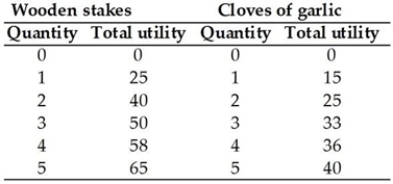
The table above shows Buffy's utility from wooden stakes and cloves of garlic. The total utility Buffy gets from 5 wooden stakes is
A) 7.
B) 65.
C) 122.
D) 222.
E) None of the above answers is correct.

Unlock Deck
Unlock for access to all 78 flashcards in this deck.
Unlock Deck
k this deck
43

The table above shows Buffy's utility from wooden stakes and cloves of garlic. The marginal utility of which clove of garlic is the largest?
A) The third clove.
B) The fifth clove.
C) The first clove.
D) The second clove.
E) The marginal utility of all cloves is the same.

Unlock Deck
Unlock for access to all 78 flashcards in this deck.
Unlock Deck
k this deck
44
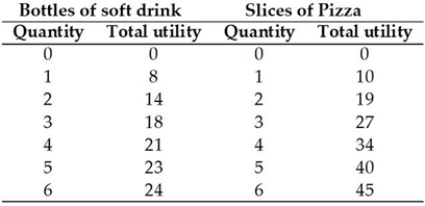
The table above gives Ali's total utility from consuming bottles of soft drink and slices of pizza. The price of pizza is $2 per slice and the price of soft drink is $1 per bottle. His marginal utility from the 4th slice of pizza is
A) 34.
B) 17.50.
C) 7.
D) 3.50.
E) 27.

Unlock Deck
Unlock for access to all 78 flashcards in this deck.
Unlock Deck
k this deck
45

Sam's total utility for bananas is in the table above. Sam's total utility shows that the law of diminishing marginal utility
A) holds because Sam's total utility from bananas increases as Sam eats more bananas.
B) holds because his marginal utility from bananas decreases as Sam eats more bananas.
C) does not hold because Sam's total utility does not reach its maximum.
D) does not hold because Sam's marginal utility does not decrease to zero.
E) None of the above answers is correct because there are no data for marginal utility with which to answer the question.

Unlock Deck
Unlock for access to all 78 flashcards in this deck.
Unlock Deck
k this deck
46
If Raul's marginal utility per dollar from bread is 25 and the marginal utility per dollar from butter is 30,
A) Raul should purchase more butter and less bread to increase his total utility.
B) Raul's marginal utility from bread will rise if he buys less bread.
C) Raul's marginal utility from butter will fall if he buys more butter.
D) Only answers B and C are correct.
E) Answers A, B and C are correct.
A) Raul should purchase more butter and less bread to increase his total utility.
B) Raul's marginal utility from bread will rise if he buys less bread.
C) Raul's marginal utility from butter will fall if he buys more butter.
D) Only answers B and C are correct.
E) Answers A, B and C are correct.

Unlock Deck
Unlock for access to all 78 flashcards in this deck.
Unlock Deck
k this deck
47
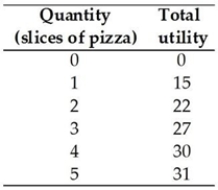
Suppose the consumer has allocated his or her entire budget. Which of the following conditions is also required for total utility to be maximised?
A) Marginal utility has decreased to zero for all goods.
B) The number of units of each good consumed must be the same.
C) The least inexpensive combination of goods has been purchased.
D) The marginal utility for each good is equal.
E) The marginal utility divided by price for each good is equal.

Unlock Deck
Unlock for access to all 78 flashcards in this deck.
Unlock Deck
k this deck
48

Sam's total utility for bananas is in the table above. Sam's marginal utility from the fourth banana is
A) 100
B) 20
C) 25
D) 15
E) It cannot be determined from the given information.

Unlock Deck
Unlock for access to all 78 flashcards in this deck.
Unlock Deck
k this deck
49

For David, the marginal utility from an additional car is 2,000 units and the marginal utility from an additional vacation is 1,000 units. David is allocating all of his budget. Hence, to maximise his utility, David will
A) save his budget by not spending it until he can afford both the car and the vacation.
B) shift his consumption from the vacation to the car.
C) buy both the car and the vacation now.
D) shift his consumption from the car to the vacation.
E) possibly do something, but there is not enough information available to determine what he would do.

Unlock Deck
Unlock for access to all 78 flashcards in this deck.
Unlock Deck
k this deck
50

The table above gives Ali's total utility from consuming bottles of soft drink and slices of pizza. The price of pizza is $2 per slice and the price of soft drink is $1 per bottle. His marginal utility from the 4th bottle of soft drink is
A) 3.
B) 5.25.
C) 21.
D) 34.
E) 3 units for soft drink ÷ 7 units for pizza.

Unlock Deck
Unlock for access to all 78 flashcards in this deck.
Unlock Deck
k this deck
51
Diminishing marginal utility means that as more of a good is consumed,
A) the consumption of some other good must diminish.
B) the price of the good rises.
C) the utility of an additional unit decreases.
D) more income is spent.
E) the price of the good falls.
A) the consumption of some other good must diminish.
B) the price of the good rises.
C) the utility of an additional unit decreases.
D) more income is spent.
E) the price of the good falls.

Unlock Deck
Unlock for access to all 78 flashcards in this deck.
Unlock Deck
k this deck
52
Suppose the price of a pair of jeans is $25 and the price of a t-shirt is $15. The consumer's budget is entirely allocated. If the marginal utility from a pair of jeans is 100 units and the marginal utility from a t-shirt is 75 units, the consumer is
A) not in equilibrium and should purchase more t-shirts and more jeans.
B) not in equilibrium but should maintain the current level of purchases.
C) in equilibrium because his or her utility is maximised.
D) not in equilibrium and should purchase fewer t-shirts and more jeans.
E) not in equilibrium and should purchase fewer jeans and more t-shirts.
A) not in equilibrium and should purchase more t-shirts and more jeans.
B) not in equilibrium but should maintain the current level of purchases.
C) in equilibrium because his or her utility is maximised.
D) not in equilibrium and should purchase fewer t-shirts and more jeans.
E) not in equilibrium and should purchase fewer jeans and more t-shirts.

Unlock Deck
Unlock for access to all 78 flashcards in this deck.
Unlock Deck
k this deck
53

For a consumer to maximise utility, in part the consumer must
A) make the marginal utility per dollar from each good as different as possible for all goods.
B) spend as little of the budget as possible.
C) allocate the entire available budget.
D) make the marginal utility per dollar from each good as small as possible for all goods.
E) Answers A and B are both correct.

Unlock Deck
Unlock for access to all 78 flashcards in this deck.
Unlock Deck
k this deck
54
The consumption of bottled water increased dramatically during the 1990s. If consumers' utility schedules for water remained constant over this time period, in order for consumers to stay in equilibrium, the price of bottled water must have
A) fallen.
B) risen because marginal utility increased since people consumed more bottled water.
C) risen because the supply of water must have increased.
D) remained constant because the marginal utility schedule did not change.
E) We don't have enough information to say what happened to the price.
A) fallen.
B) risen because marginal utility increased since people consumed more bottled water.
C) risen because the supply of water must have increased.
D) remained constant because the marginal utility schedule did not change.
E) We don't have enough information to say what happened to the price.

Unlock Deck
Unlock for access to all 78 flashcards in this deck.
Unlock Deck
k this deck
55

The above table shows Homer's utility from boxes of doughnuts. As Homer's consumption of doughnuts increases, his
A) marginal utility is negative and decreasing.
B) marginal utility is negative but increasing.
C) total utility is not related to his marginal utility.
D) marginal utility is positive but decreasing.
E) marginal utility is positive and increasing.

Unlock Deck
Unlock for access to all 78 flashcards in this deck.
Unlock Deck
k this deck
56
Assume you are in a store looking at a shirt you want to buy. You expect to buy the shirt until you look at the price, then you decide the shirt is not a good buy. How can your decision be viewed in economic terms?
A) The shirt has zero marginal utility for you.
B) The opportunity cost of the shirt was too low.
C) The shirt's marginal utility divided by price was too low compared to other goods.
D) The shirt's marginal utility divided by price was too high compared to other goods.
E) None of the above answers is correct.
A) The shirt has zero marginal utility for you.
B) The opportunity cost of the shirt was too low.
C) The shirt's marginal utility divided by price was too low compared to other goods.
D) The shirt's marginal utility divided by price was too high compared to other goods.
E) None of the above answers is correct.

Unlock Deck
Unlock for access to all 78 flashcards in this deck.
Unlock Deck
k this deck
57
Kevin likes beef stew. But every bite of the stew that he eats provides him with less and less total utility. This fact means that Kevin's marginal utility is
A) increasing at an increasing rate.
B) increasing, but at a decreasing rate.
C) decreasing.
D) not changing.
E) changing, but the rate of change is not certain without more information.
A) increasing at an increasing rate.
B) increasing, but at a decreasing rate.
C) decreasing.
D) not changing.
E) changing, but the rate of change is not certain without more information.

Unlock Deck
Unlock for access to all 78 flashcards in this deck.
Unlock Deck
k this deck
58
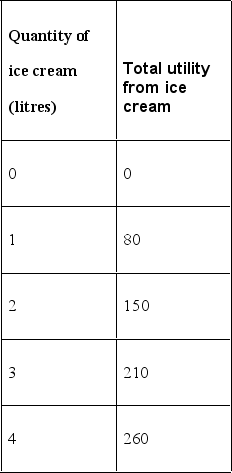
Given the data in the above table, what is the marginal utility of the second litre of ice cream?
A) 75
B) 60
C) 150
D) 80
E) 70

Unlock Deck
Unlock for access to all 78 flashcards in this deck.
Unlock Deck
k this deck
59

The table above shows Buffy's utility from wooden stakes and cloves of garlic. As Buffy uses more stakes, the marginal utility of a stake ________ and as she uses more cloves of garlic, the marginal utility of a clove of garlic ________.
A) decreases; decreases
B) decreases; increases
C) increases; decreases
D) increases; increases
E) does not change; does not change

Unlock Deck
Unlock for access to all 78 flashcards in this deck.
Unlock Deck
k this deck
60

Given the data in the above table, what is the marginal utility of the fourth litre of ice cream?
A) 210
B) 260
C) 60
D) 65
E) 50

Unlock Deck
Unlock for access to all 78 flashcards in this deck.
Unlock Deck
k this deck
61
Suppose that Misty likes pizza and hotdogs. If her marginal utility per dollar from pizza is 6 and from hotdogs is 5, Misty
A) could increase her total utility by buying more pizza and fewer hotdogs.
B) is maximising her marginal utility.
C) must obtain more income in order to reach her consumer equilibrium.
D) is maximising her total utility.
E) could increase her total utility by buying more hotdogs and less pizza.
A) could increase her total utility by buying more pizza and fewer hotdogs.
B) is maximising her marginal utility.
C) must obtain more income in order to reach her consumer equilibrium.
D) is maximising her total utility.
E) could increase her total utility by buying more hotdogs and less pizza.

Unlock Deck
Unlock for access to all 78 flashcards in this deck.
Unlock Deck
k this deck
62
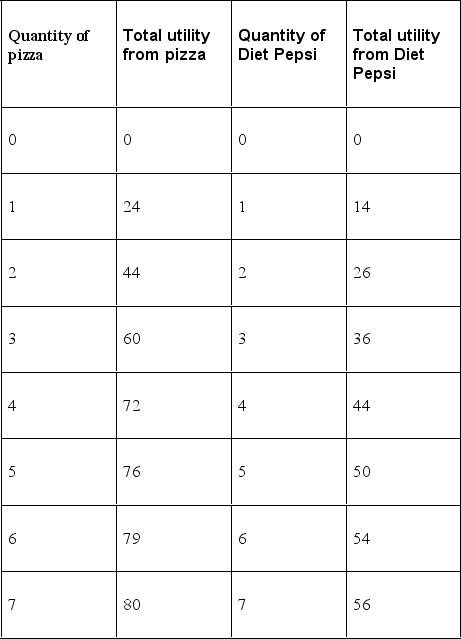
Suppose that you consume only pizza, which costs $4 per slice, and Diet Pepsi, which costs $2 per can. The table above gives your utility from consuming these two goods. If your income is $20, which of the following consumption combinations will you choose?
A) 3 slices of pizza and 4 Diet Pepsis.
B) 2 slice of pizza and 6 Diet Pepsis.
C) 5 slices of pizza and no Diet Pepsi.
D) 4 slices of pizza and 2 Diet Pepsis.
E) None of the above answers is correct.

Unlock Deck
Unlock for access to all 78 flashcards in this deck.
Unlock Deck
k this deck
63

The table above gives Ali's total utility from consuming bottles of soft drink and slices of pizza. The price of pizza is $2 per slice and the price of soft drink is $1 per bottle. Ali has $14 in his budget. When Ali maximises his utility he buys ________ bottles of soft drink and ________ slices of pizza.
A) 6; 4
B) 4; 5
C) 6; 6
D) 2; 6
E) None of the above answers is correct.

Unlock Deck
Unlock for access to all 78 flashcards in this deck.
Unlock Deck
k this deck
64
At all points on a demand curve, the i. consumer's budget has been allocated to maximise total utility.
Ii) quantity is the quantity demanded at each price when total utility is maximised.
Iii) price represents the marginal benefit the consumer gets from an extra unit of a good.
A) i only
B) ii only
C) i and ii
D) i and iii
E) i, ii, and iii
Ii) quantity is the quantity demanded at each price when total utility is maximised.
Iii) price represents the marginal benefit the consumer gets from an extra unit of a good.
A) i only
B) ii only
C) i and ii
D) i and iii
E) i, ii, and iii

Unlock Deck
Unlock for access to all 78 flashcards in this deck.
Unlock Deck
k this deck
65
Over the past 10 years, the price of a downloaded song has ________ which has led to ________.
A) decreased; a decrease in consumer efficiency
B) increased; a decrease in consumer surplus
C) not changed; no change in consumer surplus
D) decreased; an increase in consumer surplus
E) increased; an increase in consumer efficiency
A) decreased; a decrease in consumer efficiency
B) increased; a decrease in consumer surplus
C) not changed; no change in consumer surplus
D) decreased; an increase in consumer surplus
E) increased; an increase in consumer efficiency

Unlock Deck
Unlock for access to all 78 flashcards in this deck.
Unlock Deck
k this deck
66

Marginal utility is the
A) average utility per unit consumed.
B) quantity of a good a consumer prefers.
C) change in total utility that results from a one-unit increase in the quantity of a good consumed.
D) total benefit from the consumption of a good or service.
E) change in total utility that results from a one dollar increase in the price of a good consumed.

Unlock Deck
Unlock for access to all 78 flashcards in this deck.
Unlock Deck
k this deck
67

Sushi costs $3 per piece. Cynthia's total utility after eating one piece is 30 and her total utility after eating 2 pieces is 51, so her marginal utility from the second piece is
A) 17.
B) 21.
C) 51.
D) 10.
E) 7.

Unlock Deck
Unlock for access to all 78 flashcards in this deck.
Unlock Deck
k this deck
68
When Chris maximises his total utility, then his entire available budget is allocated in such a way that the
A) marginal utility is as large as possible for goods.
B) quantities consumed of each good are equal.
C) marginal utility per dollar is equal for all goods.
D) marginal utility will start decreasing if he consumes fewer goods.
E) marginal utility of all goods is equal.
A) marginal utility is as large as possible for goods.
B) quantities consumed of each good are equal.
C) marginal utility per dollar is equal for all goods.
D) marginal utility will start decreasing if he consumes fewer goods.
E) marginal utility of all goods is equal.

Unlock Deck
Unlock for access to all 78 flashcards in this deck.
Unlock Deck
k this deck
69

The table above gives Ali's total utility from consuming bottles of soft drink and slices of pizza. The price of pizza is $2 per slice and the price of soft drink is $1 per bottle. Ali has $14 in his budget. When Ali maximises his utility, his total utility equals
A) 6.
B) 9.
C) 61.
D) 69.
E) None of the above answers is correct.

Unlock Deck
Unlock for access to all 78 flashcards in this deck.
Unlock Deck
k this deck
70

Suppose that you consume only pizza, which costs $4 per slice, and Diet Pepsi, which costs $2 per can. The table above gives your utility from consuming these two goods. If your income is $14, which of the following consumption combinations will you choose?
A) 2 slices of pizza and 3 Diet Pepsis.
B) Zero slices of pizza and 7 Diet Pepsis.
C) 3 slices of pizza and 1 Diet Pepsi.
D) 1 slice of pizza and 5 Diet Pepsis.
E) None of the above answers is correct.

Unlock Deck
Unlock for access to all 78 flashcards in this deck.
Unlock Deck
k this deck
71
Goods that are valuable will have a ________ consumer surplus because ________ units of the good are consumed at a ________ price.
A) smaller; fewer; lower
B) smaller; more; lower
C) larger; less; higher
D) larger; fewer; lower
E) larger; more; lower
A) smaller; fewer; lower
B) smaller; more; lower
C) larger; less; higher
D) larger; fewer; lower
E) larger; more; lower

Unlock Deck
Unlock for access to all 78 flashcards in this deck.
Unlock Deck
k this deck
72

Moving downward along a demand curve, so that the price falls and the quantity demanded increases, the marginal utility of each additional unit of the good consumed
A) always decreases.
B) stays the same.
C) always increases.
D) at first increases and then decreases.
E) could increase, decrease or stay the same.

Unlock Deck
Unlock for access to all 78 flashcards in this deck.
Unlock Deck
k this deck
73
As more of a good is consumed, the marginal utility of an additional unit ________, so consumers are willing to pay ________ for an additional unit.
A) decreases; less
B) increases; more
C) decreases; more
D) does not change; less
E) increases; less
A) decreases; less
B) increases; more
C) decreases; more
D) does not change; less
E) increases; less

Unlock Deck
Unlock for access to all 78 flashcards in this deck.
Unlock Deck
k this deck
74
________ in consumer surplus occurs when the price of a good ________.
A) A decrease; decreases and consumers buy less of the good at the cheaper price
B) An increase; increases but the relative price does not change
C) An increase; decreases and consumers can buy more of the good at the lower price
D) A decrease; increases and the paradox of value is no longer valid
E) An increase; decreases and consumer efficiency declines
A) A decrease; decreases and consumers buy less of the good at the cheaper price
B) An increase; increases but the relative price does not change
C) An increase; decreases and consumers can buy more of the good at the lower price
D) A decrease; increases and the paradox of value is no longer valid
E) An increase; decreases and consumer efficiency declines

Unlock Deck
Unlock for access to all 78 flashcards in this deck.
Unlock Deck
k this deck
75
The maximum price a consumer is willing to pay for an extra unit of a good or service when total utility is maximised is known as
A) quantity demanded.
B) marginal utility.
C) total utility.
D) demand.
E) marginal benefit.
A) quantity demanded.
B) marginal utility.
C) total utility.
D) demand.
E) marginal benefit.

Unlock Deck
Unlock for access to all 78 flashcards in this deck.
Unlock Deck
k this deck
76

The table above gives Ali's total utility from consuming bottles of soft drink and slices of pizza. Suppose the price of a slice of pizza increases. As a result, Ali's
A) marginal utility from all the slices of pizza he consumes decreases.
B) total utility increases.
C) marginal utility per dollar from soft drink increases.
D) purchases of pizza might increase.
E) marginal utility per dollar from pizza decreases.

Unlock Deck
Unlock for access to all 78 flashcards in this deck.
Unlock Deck
k this deck
77
Jen consumes 5 DVDs and 2 tacos. She receives 500 units of utility from her 5th DVD and 200 units of utility from her 2nd taco. The price of a DVD is $10, the price of a taco is $4, and she is spending her entire budget. Which of the following is true regarding Jen's choices?
A) Jen is consuming on her demand curve for DVDs.
B) Jen is consuming on her demand curve for tacos.
C) Jen is maximising utility.
D) Only answers A and B are correct
E) Answers A, B and C are correct.
A) Jen is consuming on her demand curve for DVDs.
B) Jen is consuming on her demand curve for tacos.
C) Jen is maximising utility.
D) Only answers A and B are correct
E) Answers A, B and C are correct.

Unlock Deck
Unlock for access to all 78 flashcards in this deck.
Unlock Deck
k this deck
78

Juan's marginal utility from strawberries is 200 and his marginal utility from cream is 100. Juan spends all of his budget. The price of strawberries is $5 per kilogram and the price of cream is $5 per pint. To maximise his utility, Juan should
A) change nothing because Juan is maximising his utility now.
B) buy more cream and fewer strawberries.
C) buy less cream and fewer strawberries.
D) buy less cream and more strawberries.
E) buy more cream and more strawberries.

Unlock Deck
Unlock for access to all 78 flashcards in this deck.
Unlock Deck
k this deck


